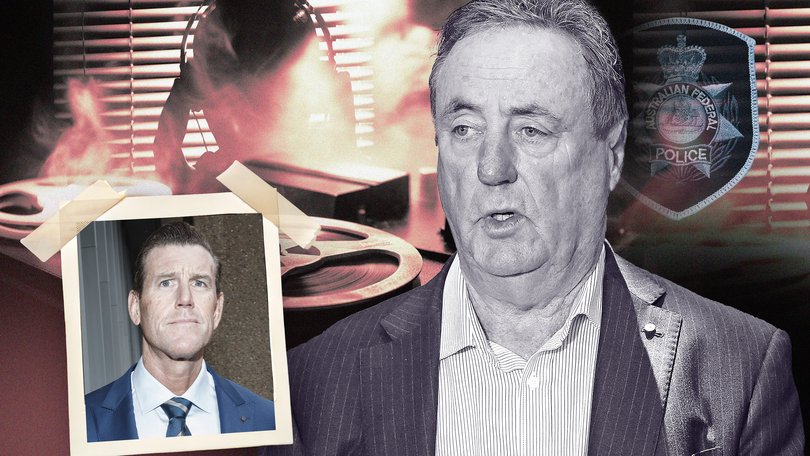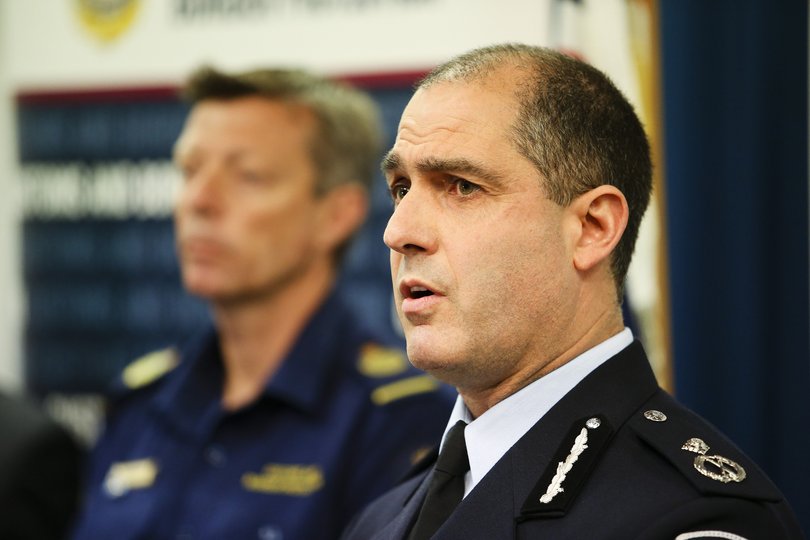Mick Keelty, former AFP chief, reveals why he filed Commonwealth complaint against federal police officers
How a wire tap witch-hunt over disproved Ben Roberts-Smith claims ended the aspirations of a prospective federal commissioner and sparked a former AFP chief’s scathing submission into the force he used to lead.

Former AFP Commissioner, Mick Keelty, has revealed for the first time he has filed a complaint with the Commonwealth Ombudsman over what he labelled as the “unethical and immoral” behaviour of officers from the force he once proudly led.
In an extraordinary move, Mr Keelty, who was the the nation’s top cop for eight years until 2009 and who has continued to work as a high-level government adviser, wrote a scathing submission calling for an inquiry into how telephone intercept warrants had been obtained under what he believes were false pretences.
“I believe I have uncovered a biased and dangerous practice adopted by the ACLEI (the former police integrity watchdog) and AFP joint investigation team … where communications interception affidavits were used to ‘retro fit’ a pre-determined guilt of the parties involved,” Mr Keelty wrote.
Sign up to The Nightly's newsletters.
Get the first look at the digital newspaper, curated daily stories and breaking headlines delivered to your inbox.
By continuing you agree to our Terms and Privacy Policy.Mr Keelty’s shock submission was sparked by a confidential referral to ACLEI in 2018, which became Operation Geranium, alleging that then-AFP Deputy Commissioner Ramzi Jabbour had leaked confidential information about a secret war crimes investigation into Australia’s most decorated living soldier, Ben Roberts-Smith.
It was alleged that Mr Jabbour had leaked the information to Mr Keelty, who was by then working a government consultant. It was then claimed that Mr Keelty tipped off Mr Roberts-Smith when he met with the soldier.
The bizarre claims were later leaked to the media amid allegations the covert inquiry was compromised when Mr Roberts- Smith found out he was being targeted in a war crimes investigation.
But Mr Keelty said he didn’t know Mr Roberts-Smith before they met, and he had been asked to do a welfare check at the behest of a potential employer of the soldier, after very public media reports, days earlier, disclosed a confidential defence inquiry was taking evidence about SAS soldiers committing war crimes. It is understood that the potential employer in question was not Seven West Media, where Mr Roberts-Smith had worked until 2023, and which is the publisher of The Nightly
Mr Keelty revealed that what made the situation even stranger was that he had actually first called the AFP’s then-commissioner, Andrew Colvin, to check in with him about meeting Mr Roberts-Smith after the media reports on the defence inquiry.
Mr Keelty said he was told by Mr Colvin there was “stuff around” but nothing concrete that he knew of and it appeared to be OK to go ahead and meet with Mr Roberts-Smith.
A week later just before the meeting was due to take place, Mr Keelty rang back to check make nothing had changed on the matter.
Mr Colvin was on leave at the time and his office put the fateful call through to Mr Jabbour, who was unofficially acting Commissioner on the day.
However, Mr Jabbour knew nothing about the defence investigation and in turn put Mr Keelty in touch with another deputy, Neil Gaughan.
Subsequently, a confidential complaint was made against Mr Jabbour, a popular career cop with decades of experience, who was seen as a strong contender for the AFP Commissioner’s job when Mr Colvin retired. Police sources say Mr Jabbour’s strong position in the race for the top job led to him becoming a target.
The complaint started a chain of events that led to the AFP/ACLEI investigation team applying for the telephone intercept warrants in its years-long investigation - one which effectively took Mr Jabbour out of the running to lead the AFP - only to find the allegations were actually baseless.
Mr Jabbour was eventually cleared of any wrongdoing.

However, in the meantime former Northern Territory Commissioner Reece Kershaw was subsequently appointed AFP Commissioner and Mr Jabbour resigned. Mr Kershaw resigned from his post earlier this month.
The ACLEI investigation found Mr Jabbour had never been privy to the secret inquiry information – because it had been siloed within the AFP – which meant he could never have passed it on.
Mr Colvin declined to comment on the matter this week, but said he was pleased that Mr Jabbour and Mr Keelty were both cleared.
Mr Roberts-Smith has never been charged with any crime over his service in Afghanistan. The veteran however lost a defamation trial he launched in The Federal Court to try to clear his name after media reports accused him of being complicit in the murder of Afghan prisoners.
Mr Keelty said before calling in the watchdog, some basic due diligence and proper investigation by the AFP in the first place would have revealed the premise that the covert investigation had been leaked was ridiculous.
“The whole thing was ludicrous, and it should have been stopped right at the beginning,” Mr Keelty told The Nightly.
No one has ever been charged with leaking anything and no government agency has ever publicly alleged that Mr Roberts-Smith was alerted either directly or indirectly by anyone in the AFP about any war crimes investigation into him.
Mr Keelty said that after the ACLEI inquiry found no case to answer, “the Ombudsman needs to give the closer scrutiny to what occurred and how the Telecommunications (Interception) Act 1979 was potentially abused and/or misused.”
He has called for an inquiry into the actions of the AFP and ACLEI - which has now been superseded by the National Anti-Corruption Commission - during the investigation. Mr Keelty’s call was based on his claim that the alleged offence did not meet the threshold test for the telephone intercept warrants used in the first place.
He also questioned why the intercept warrants were obtained in the Administrative Appeals Tribunal, and not the Federal Court, where they would likely have received more scrutiny.
“The Telecommunications Interception legislation does not permit ‘fishing expeditions”. Nor does it allow interception warrants to be granted for intelligence purposes as opposed to evidentiary purposes when used by law enforcement agencies,” (in these circumstances at the time), he wrote in his submission.
Mr Keelty also accused investigators of engaging in immoral tactics by trying to entrap targets by concocting false narrative conversations which would otherwise not have taken place as the parties were no longer in communication with each other.
He said it also appeared that the investigative teams did not comply with Subsection 124 (1) of the Telecommunications (Interception) Act 1979 to revoke the warrant when it failed to produce any admissible evidence instead choosing instead to ‘stimulate’ conversations between innocent parties.
He said there are “structural problems in both the AFP and ACLEI where insufficient due diligence and governance structures were in place.
“ I remain convinced that material gleaned from the first Operation Geranium communications warrant ... was used to ‘bolster’ subsequent affidavits because the investigators remained convinced that a ‘secret’ war crimes investigation underway against a prominent Australian had been either deliberately or inadvertently breached,” he submitted.
Six years later and after hundreds of thousands of taxpayer’s dollars have been spent, media outlets are stilling fighting the AFP. using Freedom of Information laws to track down the statements that possibly sparked the witch hunt.
The Federal Court has reportedly already ruled a lot of the information could be safely released. Yet the AFP has continued to fight.
The Ombudsman has just ruled out an investigation into the matter.
